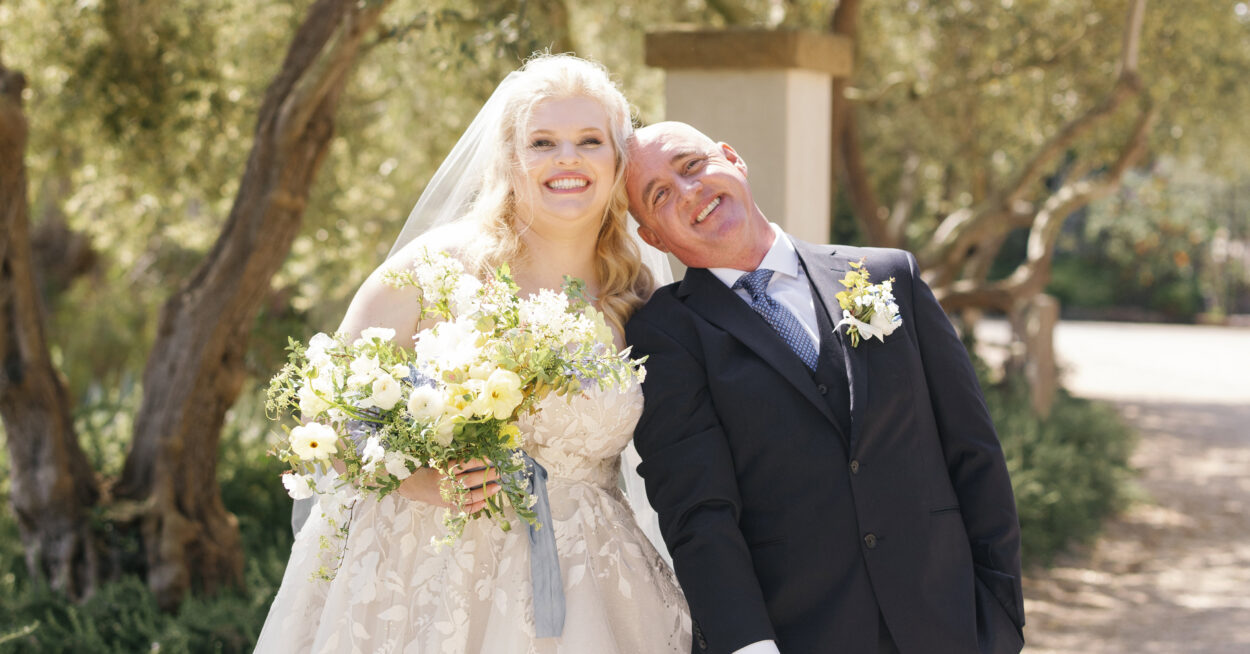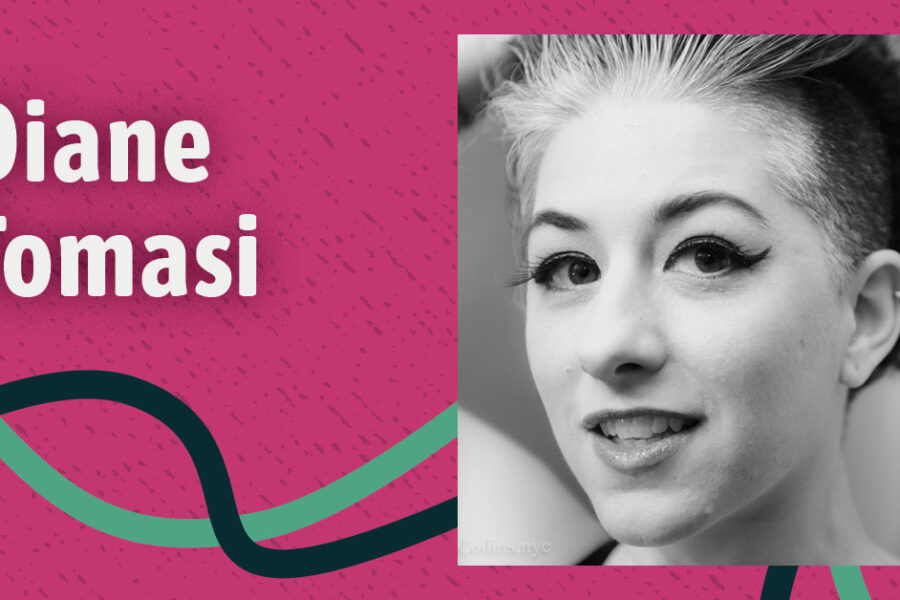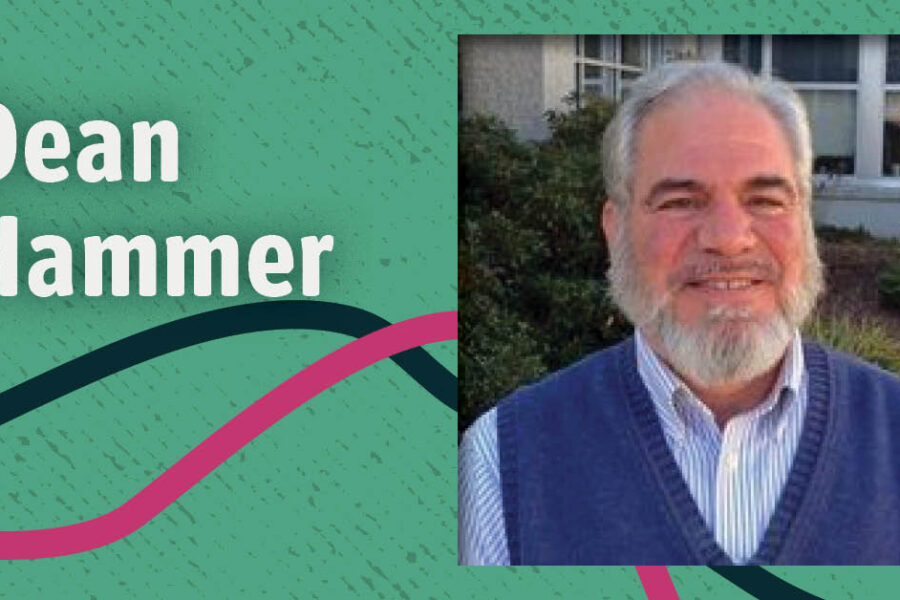When I met over Zoom with J.T. Derwart and Alexandra Block on a Sunday in late fall that was unseasonably hot all across Southern California they were seated in their home in Sherman Oaks. As one of their cats, Sugar, lounged serenely on a sectional in the background, Block and Derwart, who married just last summer, told the story of how they met as undergraduates at Antioch Los Angeles, how they started dating, and why they both eventually decided to continue their educations by returning to Antioch to complete degrees in the Master of Arts in Clinical Psychology program.
A Poetic Meet-Cute
Derwart and Block met as undergraduates in Ed Frankel’s “Early American Poetry” class in 2014. Their first interaction was an argument over their interpretations of a particular poem. But soon they built a friendship.
Their first date wasn’t exactly a date. Derwart approached Block for some help with their shared class, “Academic Writing.” They made plans to meet up. By this point, Block already had a crush on Derwart, and she thought their study session might actually be a date. When Derwart arrived at her house in sweatpants, bookbag in tow, she realized that he honestly just wanted help with his essay. Derwart mentioned that he had been out of school for twelve years and genuinely needed pointers on syntax and grammar. They had a ways to go before becoming a quintessential Antioch couple.
Shared Interests and an Easy Rapport
As they got to know each other, Block learned that Derwart had spent his adult life working as a stand-up comic, actor, and contractor. His decision to return to school two years previous had been prompted by his son’s birth. (Derwart had since separated from his child’s mother, with whom he amicably co-parents.) Derwart meanwhile, learned that Block had been a competitive equine athlete for most of her life, and that her father, like him, was from Baltimore.
They found that they both were happy to be completing their bachelor’s degrees at Antioch, which helped them to transfer credits from previous classes they had taken at other schools. As Derwart explains, he was engaged by faculty like David Tripp, who “was quite engaging and kind of spoke my language.” As Derwart explains “He was a great advocate for this school.” Today, Block agrees. “For both of us,” she says, “it’s really a unique place that’s given us a birth of opportunity, that I don’t know that we would have had otherwise.”
But back in that early study session, amidst a conversation about their classes and Antioch, they were not yet a couple, nor Antioch double alums. But it was during that not-a-date that something clicked for Derwart, and he realized that Block was actually interested in him, and he was interested in her. So he asked her out as soon as they were done studying, and they immediately had their first real date at the IHOP in Agoura Hills, since it was open late. (Amazingly, this storefront had once been a Denny’s, and it was in this exact Denny’s that Block’s parents had gone on their first date, too.)
Block immediately found herself smitten with Derwart. “What attracted me to him was his integrity. His intelligence, if not always articulation, his value system, and his sense of humor.” She especially liked how kindness seemed to undergird his sense of humor, which she says was “never deprecating to others or self-deprecating.” Instead, he used “his sense of humor to lift people up, and that’s just kind of energetically what drew me to him, and it just kind of budded it from there.”
Derwart was equally smitten with Block, but “when we started dating,” he says, “I really didn’t think I had a chance.” Partly because he saw so clearly her many good sides. “She is so kind and sweet and empathetic. We both see the world very differently, but she is able to tune into others in a way that I am not.” He says that he “instantly” admired and respected her. And as they continued dating, he found that their relationship was more harmonious than any he had ever been in before. “We would argue, and still do,” he says, “but it was always a fair fight and never malicious. For me, that has always been something truly special. It’s rare that you’re able to disagree with someone and still respect their point of view.”
Returning to School, Together
The couple graduated with BAs from Antioch at the same time in 2016, and immediately they both decided to continue their education by enrolling as students in the MA Program in Clinical Psychology. Block, who studied Spiritual and Depth Psychology as her clinical focus, knew all along that she wanted to pursue a master’s at Antioch. She loved the social justice aspect of the University’s curriculum and its egalitarian approach to education.
Today, Block is pursuing a Doctorate at the Chicago School for Professional Psychology, but she says that she would have loved to return to Antioch for the PhD program based in Santa Barbara were it not such a long commute. Her dissertation is about Equine Assisted psychotherapy, and the therapeutic efficacy of horses specifically on family healing, something that is both distinct and related to her current work as a Marriage and Family Therapist at a group practice called Yoffe Therapy. This practice focuses on the adoption constellation—children, adoptive parents, and birth parents involved in the foster care system. She trained post-practicum Dr. Silvina Irwin, at the Emotionally Focused Resource Center, and she explains that the community-centered spirit of the Antioch curriculum is still at the center of her therapeutic approach.
The same is true for Derwart. Although he didn’t initially anticipate this path, deciding to study for an MA in Clinical Psychology was a very organic process. One of his primary teachers was core faculty member Erica Holmes. “She was really a catalyst for a lot of things for me,” he says, and she “helped me tremendously going through it.”
As a graduate student, his clinical focus was trauma, something he had personal experience with and wanted to address communally through his work. He explains that because he and Block both gravitate toward community-based healing they balance each other out despite their distinct therapeutic approaches. “Professionally, she works in a way that I never could,” says Derwart. “I am much more solution-focused. She has the ability to truly sit with someone and their emotions, and allow people to feel through their pain. She’s able to help people contain so much.”
Today Derwart practices trauma-centered work at his job at the nonprofit New Directions for Veterans, on the campus of the West Los Angeles Veterans Administration Hospital. He began working with veterans as a trainee clinician while studying to become a Marriage and Family Therapist. At New Directions for Veterans he runs the Adult Full Service Partnership Program, working with acute and severely mentally disabled vets, all the way from Skid Row to West Los Angeles, who are homeless or recently released from prison or jail.
Derwart wasn’t able to work from home at all during the pandemic, as he was classified as a first responder because his work is potentially life-saving for clients in highly vulnerable circumstances. This was difficult, especially since his nine-year-old son lives with him and Block half the time. But Derwart loves his work, and he’s thankful to be able to practice within a community where he can be of service.
After graduating from the master’s program, Derwart continued to have conversations about his career with Charley Lang, a faculty member in both the Psychology department and a teacher in the undergraduate liberal studies concentration. Derwart describes Lang as “a mentor, a professor, and someone I look up to.” In these conversations, though, he was also “the one that gave me the nudge to believe that I could teach.” Lang worked with him to find the right subject to teach at Antioch, with one idea circling around how in his master’s thesis Derwart discussed the incorporation of humor in therapy as an intervention. The two bounced a few ideas around for workshops and eventually ended up with a workshop in the addiction studies program on the historical approaches to recovery.
The workshop addresses the history of addiction- and abstinence-based movements from the founding of the United States through 1939, when the twelve-step program became the primary model for recovery. Some of these early programs, as Derwart explains, are related to different social movements, including the women’s suffrage movement. All are deeply interconnected with the history of American therapeutic practices.
In our conversation, Derwart mentions that he would like to teach more, but that for the time being his family and his work keep him quite busy, in a good way.
Block chimes in. “If I can back up just for a second,” she says, “he’s too modest to say, but—his Field Service Partnership program? He built the program from the ground up. I don’t know how he did it, except for just not stopping, but I’m really proud of him.”
A Loving and Supportive Partnership
As Derwart and Block discuss each other’s accomplishments and their relationship, they often fill in the gaps for one another. Each clearly very proud of the other’s accomplishments and deeply invested in the life they have built together, both professionally and personally. As Derwart explains, “Bottom line, I love her, and I’m lucky that Antioch brought us together.”
They also are clear about how thankful they are to have developed and maintained a strong rapport with Antioch faculty and peers. And their instructors at Antioch have continued to be generous in giving out advice. “There was also a comfort level to be able to call my former professors,” says Derwart. “It is not necessarily apparent in all academic environments, and to be able to honestly call them as advisors and colleagues to kind of get support after I graduated—it’s pretty cool.”
Ultimately, the breadth and depth of Antioch’s offerings bring like-minded people together from all different backgrounds, and sometimes they meet and fall in love. In addition to Derwart and Block, I’ve met three couples who connected during their academic tenure at Antioch. But Derwart and Block clearly have something special. They are making an impact in the Los Angeles area through their work as therapists. As a couple, they share a perspective that helps them to support one another in their careers.
“I think most importantly, we are just like any other couple,” says Block. “Perhaps the only difference, really, is we understand that fighting is normal, and the need to repair and talk through things after rifts is important. And that there is no shame in getting help!” Their relationship is intertwined with their shared career path, and they live their own advice and values. Also, adds Block, “We’re also pretty good at using ‘I’ statements.”




